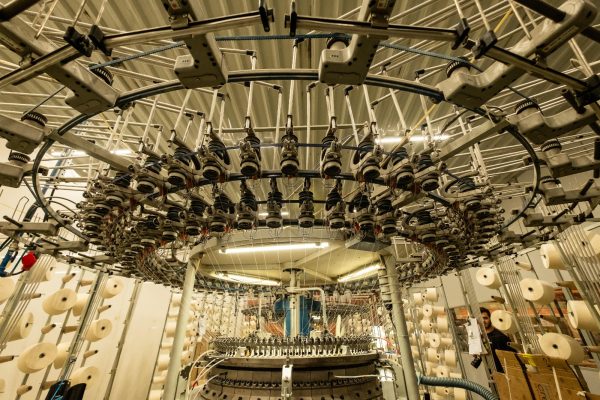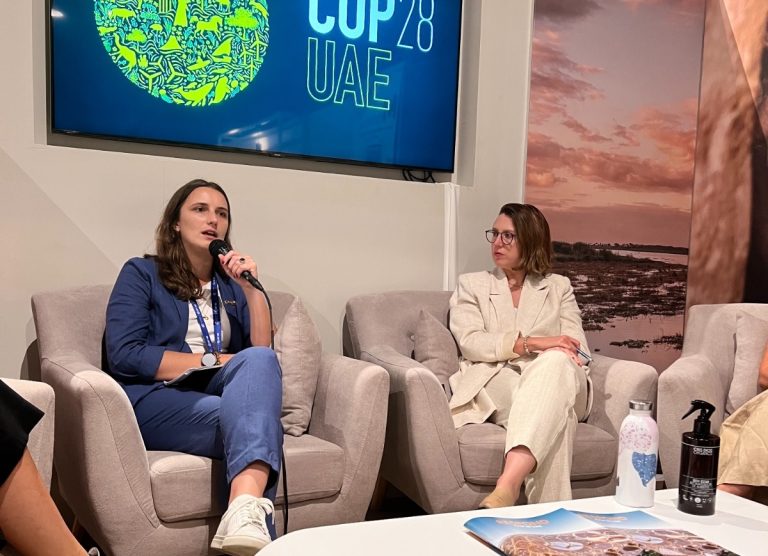São Paulo – Brazilian textile company Lunelli based in Santa Catarina was represented at the U.N. climate summit COP28 in Dubai by the company’s sustainability expert Mariana Emmerich (pictured, L), who spoke on panels about fashion and sustainability during the event and highlighted the company’s progress in sustainability practices.
“Sustainability is part of the DNA of Lunelli, which is a family business that started small and has grown since, always thinking about the optimization of resources,” the expert told ANBA.
Emmerich talked in panels about the journey of Lunelli, which she said already started sustainable by making diapers out of the industry’s fabric leftovers in 1981. The panels were themed “Shaping a Sustainable Future: Building a Sustainable Fashion and Beauty Industry” and “Successful Stories of Governance and ESG Challenges.” ESG stands for environmental, social and corporate governance.
“On the fashion and beauty panel, we were the only textile firm and had a very enriching talk. It is interesting to note the power that the industry has to influence the consumer behavior, of talking the consumer into conscious consumption and searching for certified, traceable fashion products. We can’t make any change as fashion companies alone, because the shift towards conscious consumption has to be collective,” she said.
A signatory of the U.N. Global Compact Brazil since November, Lunelli is committed to the Sustainable Development Goals (SDGs). The company established the sustainability department in 2019, but Emmerich said an ISO 14001-certified environmental management system had been in existence since 2006.
“The Compact is also part of our strategy, and being with them at COP28 has been very important This adherence came to confirm our pledges and account for our progress. We were already voluntarily prioritizing the SDGs,” she said.
In 2022, the company saw a restructuration that combined the sustainability department and the governance and audit department, making ESG strategic for its business model, said Emmerich. “It was a maturing process to bring ESG into the business strategy as for the business to be sustainable, it has to be economically viable,” she said.

Lunelli now has two sustainability reports that are published with a series of ESG sustainability iniciatives.
To reduce the environmental impacts of the textile industry, Lunelli invests in low-impact raw materials and eco-efficient processes like certified cotton and viscose, and it is a member of the Better Cotton Initiative (BCI) for a more responsible production of cotton throughout the textile chain.
It also has the country’s largest digital stamping that optimizes the process and has boosted the output by 24%, cutting the water consumption by 15% compared to the traditional processes.
A sustainable technology has recently been implemented, of modal, biodegradable fabric like viscose, based on wood. Lunelli wants to put on the market an average of 4 tonnes a month. The fabric values the recovery of wood by-products, contributing to a more sustainable cycle.
Lunelli has been in operation for 42 years and owns two business units, one of fabrics and one of clothing, which features eight children’s, women’s and men’s clothing, swimwear, and denim. The family business has plants in Santa Catarina, São Paulo, Ceará, and Paraguai and over 5,000 employees.
Fashion exports
Lunelli has a large presence in Brazil and has its own stores and or collections in multibrand stores across all Brazilian states. Overseas, some 80% of the sales go to South and Central America countries, but it also operates in North America and Europe. Earlier this year, it stated selling to Lebanon and has orders from the Arab country for the next year. The company plans on expanding into other regions, including the Middle East.
A lesson that Emmerich took from her trip to Dubai was that there are challenges across all industries, that the change is collective and that “local actions and solutions for global problems” are being conducted.
Translation by Guilherme Miranda




